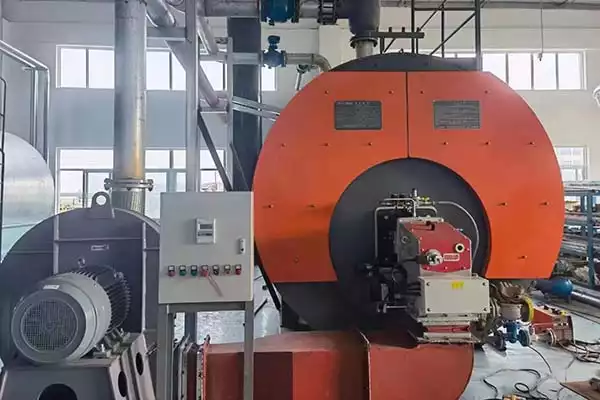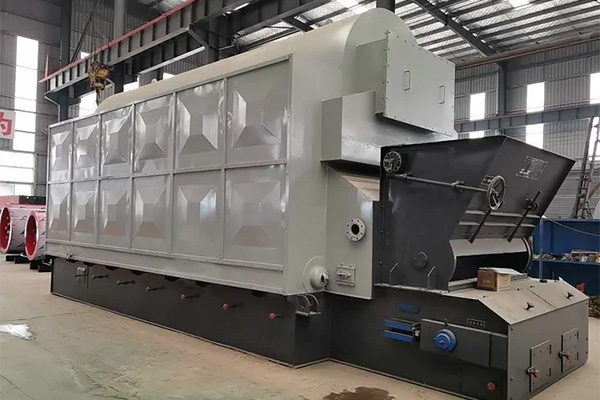
Il riscaldamento di una casa è essenziale, Soprattutto durante l'inverno. Nelle regioni più fredde, Avere un sistema di riscaldamento affidabile è un must. Una domanda a cui i proprietari di case devono rispondere è se installare una caldaia a gas o una caldaia elettrica. Entrambi hanno i loro vantaggi e svantaggi. Questo articolo confronterà i due e aiuterà i proprietari di case a decidere quale è meglio per le loro esigenze specifiche.
UN caldaia a gas è un sistema di riscaldamento che utilizza il gas come fonte di carburante per generare calore per un edificio o una casa. Le caldaie a gas funzionano bruciando gas naturale o propano per creare acqua calda o vapore, che viene quindi diffuso in tutto l'edificio tramite radiatori o sistemi di riscaldamento a pavimento.
I componenti principali di una caldaia a gas includono un bruciatore, Uno scambiatore di calore, una pompa, e controlli. Il bruciatore accende il gas e produce una fiamma, che riscalda lo scambiatore di calore. Lo scambiatore di calore trasferisce quindi il calore all'acqua o al vapore che verrà distribuito in tutto l'edificio. La pompa aiuta a far circolare l'acqua calda o il vapore, e i controlli regolano la temperatura e la pressione del sistema.
Le caldaie a gas sono popolari perché sono efficienti e relativamente facili da installare e mantenere. Possono essere utilizzati in una varietà di applicazioni, Dalle case residenziali ai grandi edifici commerciali. Tuttavia, È importante garantire che le caldaie a gas siano installate e mantenute correttamente per garantire un funzionamento sicuro ed efficiente.
Una caldaia a gas funziona bruciando gas naturale o propano per riscaldare l'acqua. L'acqua viene riscaldata in una camera di combustione e quindi circola attraverso i tubi a radiatori o tubi di riscaldamento a pavimento. I gas di combustione prodotti sono sfiatati fuori casa attraverso una canna.
UN caldaia elettrica è un sistema di riscaldamento che utilizza l'elettricità come fonte di energia per generare calore per un edificio o una casa. A differenza delle caldaie a gas, Le caldaie elettriche non bruciano carburante per creare calore. Invece, Usano elementi di riscaldamento della resistenza elettrica per riscaldare l'acqua o generare vapore.
I componenti di base di una caldaia elettrica includono gli elementi di riscaldamento, Un serbatoio di accumulo d'acqua, una pompa, e controlli. Gli elementi di riscaldamento sono in genere realizzati in metallo e generano calore quando una corrente elettrica passa attraverso di essi. Il serbatoio di accumulo dell'acqua contiene l'acqua riscaldata o il vapore, che viene quindi diffuso in tutto l'edificio tramite una pompa. I controlli regolano la temperatura e la pressione del sistema.
Le caldaie elettriche sono popolari nelle aree in cui il gas non è prontamente disponibile o in cui l'elettricità è più economica del gas. Sono anche utilizzati negli edifici in cui le caldaie a gas non sono consentite a causa di problemi di sicurezza. Le caldaie elettriche sono generalmente più costose da usare rispetto alle caldaie a gas, ma sono spesso più facili da installare e mantenere.
Un vantaggio delle caldaie elettriche è che non producono emissioni, rendendoli un'opzione più pulita per il riscaldamento. Tuttavia, L'elettricità utilizzata per alimentarli può essere generata dai combustibili fossili, che può contribuire alle emissioni di gas serra.
Una caldaia elettrica funziona usando l'elettricità per riscaldare l'acqua. L'acqua viene riscaldata in un elemento di riscaldamento e quindi circola attraverso i tubi a radiatori o tubi di riscaldamento a pavimento. Non c'è combustione coinvolta, Quindi non è necessario una canna fumaria o uno sfiato.
Il costo dell'installazione di una caldaia a gas può variare $2,500 A $7,500, A seconda del tipo di caldaia e della complessità dell'installazione. Il costo dell'installazione di una caldaia elettrica può variare $1,000 A $3,000, A seconda del tipo di caldaia e della complessità dell'installazione.
In termini di costi operativi, Le caldaie a gas sono generalmente più economiche da funzionare rispetto alle caldaie elettriche. Secondo gli Stati Uniti. Amministrazione delle informazioni energetiche, Il costo medio del gas naturale negli Stati Uniti. In 2021 era $10.52 per mille piedi cubi, mentre il costo medio dell'elettricità era 13.31 centesimi per chilowattora.
Le caldaie elettriche sono altamente efficienti dal punto di vista energetico, con quasi 100% dell'energia consumata convertita in calore. Caldaie a gas, d'altra parte, sono meno efficienti dal punto di vista energetico, con un po 'dell'energia che si perde attraverso la canna fumaria.
Tuttavia, L'efficienza energetica complessiva di un sistema di riscaldamento dipende anche dal modo in cui la casa è isolata e da quanto efficiente il sistema viene azionato.
Sia le caldaie a gas che le caldaie elettriche richiedono una manutenzione regolare per garantire che funzionino in modo sicuro ed efficiente. Le caldaie a gas richiedono ispezioni e pulizie annuali per prevenire perdite di monossido di carbonio e assicurarsi che il sistema funzioni correttamente.
Le caldaie elettriche richiedono meno manutenzione rispetto alle caldaie a gas, senza bisogno di ispezioni annuali o pulizia. Tuttavia, Gli elementi di riscaldamento nelle caldaie elettriche possono logorarsi nel tempo e potrebbe essere necessario sostituire.
Sia le caldaie a gas che le caldaie elettriche possono essere sicure se installate e mantenute correttamente. Tuttavia, Le caldaie a gas rappresentano un maggior rischio di perdite di monossido di carbonio e incendi se non installate o mantenute correttamente.
Le caldaie elettriche non producono monossido di carbonio o pongono un rischio di incendio, ma rappresentano un rischio di scosse elettriche se non installate o mantenute correttamente.
Le caldaie a gas contribuiscono alle emissioni di gas serra e ai cambiamenti climatici bruciando gas naturale o propano. Le caldaie elettriche non producono emissioni e sono quindi più rispettose dell'ambiente.
Tuttavia, L'impatto ambientale di una caldaia elettrica dipende da come viene generata l'elettricità. Se l'elettricità proviene dai combustibili fossili, come carbone o gas naturale, L'impatto ambientale sarà simile a quello di una caldaia a gas.

Insomma, Sia le caldaie a gas che le caldaie elettriche hanno i loro vantaggi e svantaggi. Le caldaie a gas sono generalmente più economiche da correre e più veloci per riscaldare l'acqua, Ma rappresentano un maggior rischio di perdite di monossido di carbonio e richiedono una linea di gas e uno sfiato. Le caldaie elettriche sono più sicure, più ecologico, e richiedono meno manutenzione, ma sono generalmente più costosi da eseguire e potrebbero non essere compatibili con i sistemi di riscaldamento esistenti.
Alla fine, La scelta tra una caldaia a gas e una caldaia elettrica dipende dalle esigenze specifiche del proprietario della casa. È essenziale considerare fattori come il costo, efficienza energetica, Requisiti di manutenzione, sicurezza, e impatto ambientale prima di prendere una decisione.
Le caldaie elettriche sono generalmente meno costose da installare rispetto alle caldaie a gas, con costi di installazione che vanno da $1,000 A $3,000 rispetto a $2,500 A $7,500 per caldaie a gas.
Le caldaie elettriche sono più efficienti dal punto di vista energetico rispetto alle caldaie a gas, con quasi 100% dell'energia consumata convertita in calore. Le caldaie a gas sono meno efficienti dal punto di vista energetico, con un po 'dell'energia che si perde attraverso la canna fumaria.
Le caldaie a gas possono comportare un maggior rischio di perdite di monossido di carbonio e incendio se non installate o mantenute correttamente, mentre le caldaie elettriche non producono monossido di carbonio o pongono un rischio di incendio. Tuttavia, Le caldaie elettriche possono rappresentare un rischio di scosse elettriche se non installate o mantenute correttamente.
Le caldaie elettriche potrebbero non essere compatibili con i sistemi di riscaldamento esistenti e possono richiedere una revisione completa del sistema per l'installazione.
Le caldaie elettriche sono più rispettose dell'ambiente rispetto alle caldaie a gas perché non producono emissioni. Tuttavia, L'impatto ambientale di una caldaia elettrica dipende da come viene generata l'elettricità, con l'elettricità generata da fonti rinnovabili che sono le più rispettose dell'ambiente.
PREVENTIVI CALDAIE GRATUITI
Nessun ritardo, Ottenere 3 citazioni oggi Confronta per i migliori prezzi Sicuro e affidabileRECENSIONI
COSA C'È IN QUESTO ARTICOLO?

Selezione della caldaia a biomassa e influenza del combustibile sulla selezione della caldaia Progetti di generazione di energia

Cos'è una caldaia a vapore e come funziona?

Caldaie a vapore a legna: Una sostenibilità, Soluzione di riscaldamento efficiente

Risparmio sui costi con le caldaie a biomassa: Produzione efficiente di elettricità e soluzioni energetiche sostenibili
vVisualizza le recensioni dei nostri clienti
"La caldaia a vapore di Fangkuai è perfetta per la mia attività di trasformazione alimentare. Soddisfa tutti i nostri requisiti ed è molto affidabile. La qualità dei materiali e la costruzione della caldaia sono eccezionali. È anche molto facile da usare e mantenere, che ci ha aiutato a risparmiare tempo e denaro per la manutenzione. Consiglio vivamente le caldaie a vapore di Fangkuai a chiunque necessiti di soluzioni di riscaldamento affidabili."
Json
Brasile"Ho acquistato una caldaia a vapore Fangkuai per la mia fabbrica e funziona perfettamente da mesi ormai. La qualità dei materiali e la costruzione della caldaia sono impressionanti. È anche molto efficiente dal punto di vista energetico, che ci ha aiutato a risparmiare sulle nostre bollette energetiche. Consiglio vivamente i prodotti Fangkuai a chiunque necessiti di soluzioni di riscaldamento affidabili ed efficienti."
John
Stati Uniti d'America"Il generatore di vapore di Fangkuai è perfetto per la mia piccola impresa. È molto facile da usare e richiede una manutenzione minima. È anche molto efficiente dal punto di vista energetico, che mi ha aiutato a risparmiare sulle mie bollette energetiche. Anche il servizio clienti di Fangkuai è eccellente. Sono molto reattivi e sempre disposti ad aiutare. Consiglio vivamente i generatori di vapore di Fangkuai."
Ahmad
Egitto"I generatori di vapore di Fangkuai sono eccellenti. Sono molto facili da usare e richiedono una manutenzione minima. Anche il servizio clienti di Fangkuai è eccezionale. Sono molto reattivi e sempre disposti ad aiutare. Notevole anche l'efficienza energetica dei generatori di vapore, che mi ha aiutato a risparmiare sulle mie bollette energetiche. Consiglio vivamente i generatori di vapore di Fangkuai."
Maria
Spagna"La caldaia ad olio diatermico di Fangkuai è molto facile da usare e manutenere. Ci ha aiutato a risparmiare tempo e denaro sulla manutenzione, che ha portato a notevoli risparmi sui costi. La qualità dei materiali e la costruzione della caldaia sono eccezionali. È anche molto efficiente dal punto di vista energetico, che ci ha aiutato a risparmiare sulle nostre bollette energetiche. Consiglio vivamente la caldaia a olio diatermico di Fangkuai ."
Allen
Brasile"Ho acquistato una caldaia a vapore Fangkuai per la mia fabbrica e funziona perfettamente da mesi ormai. La qualità dei materiali e la costruzione della caldaia sono impressionanti. È anche molto efficiente dal punto di vista energetico, che ci ha aiutato a risparmiare sulle nostre bollette energetiche. Consiglio vivamente i prodotti Fangkuai a chiunque necessiti di soluzioni di riscaldamento affidabili ed efficienti."
John
Stati Uniti d'America"Sono rimasto molto colpito dalla qualità della caldaia per l'acqua calda di Fangkuai. È costruito per durare e ha superato le mie aspettative. Anche il processo di installazione è stato molto fluido e il servizio clienti è stato eccellente. La caldaia per l'acqua calda è molto facile da usare e manutenere, e l'efficienza energetica è notevole. Consiglio vivamente le caldaie ad acqua calda di Fangkuai."
Jack
Australia"Utilizziamo da anni la caldaia ad olio diatermico Fangkuai per il nostro impianto chimico e non ci ha mai deluso. La caldaia è molto resistente e può resistere a condizioni difficili. È anche molto facile da usare e mantenere, che ci ha aiutato a risparmiare tempo e denaro per la manutenzione. Le caldaie ad olio diatermico Fangkuai sono di prim'ordine e le consiglio vivamente a chiunque necessiti di soluzioni di riscaldamento affidabili."
Chang
Cina"Il servizio clienti di Fangkuai è di prim'ordine. Mi hanno aiutato a scegliere la caldaia perfetta per le mie esigenze e mi hanno fornito un grande supporto durante tutto il processo. Anche il processo di installazione è stato molto fluido e la caldaia ha superato le mie aspettative. È molto facile da usare e mantenere, e l'efficienza energetica è notevole. Consiglio vivamente i prodotti Fangkuai a chiunque necessiti di soluzioni di riscaldamento affidabili ed efficienti."
Giovanni
Messico